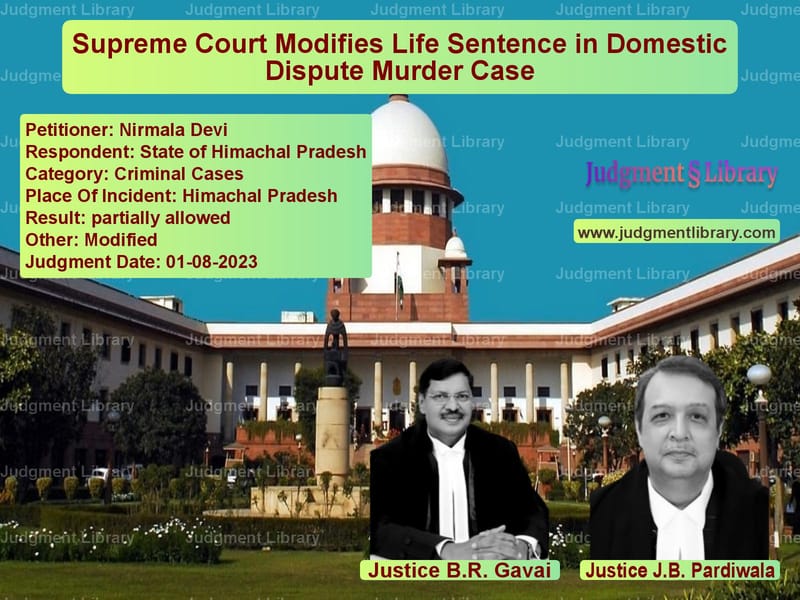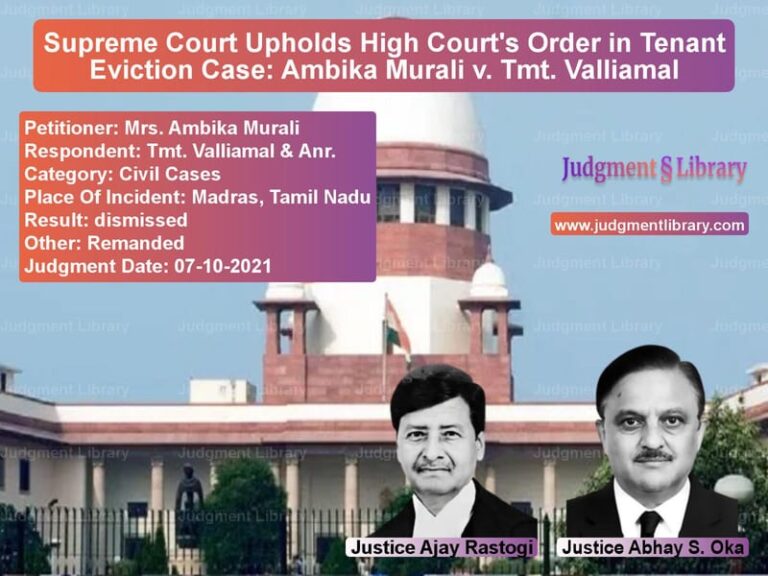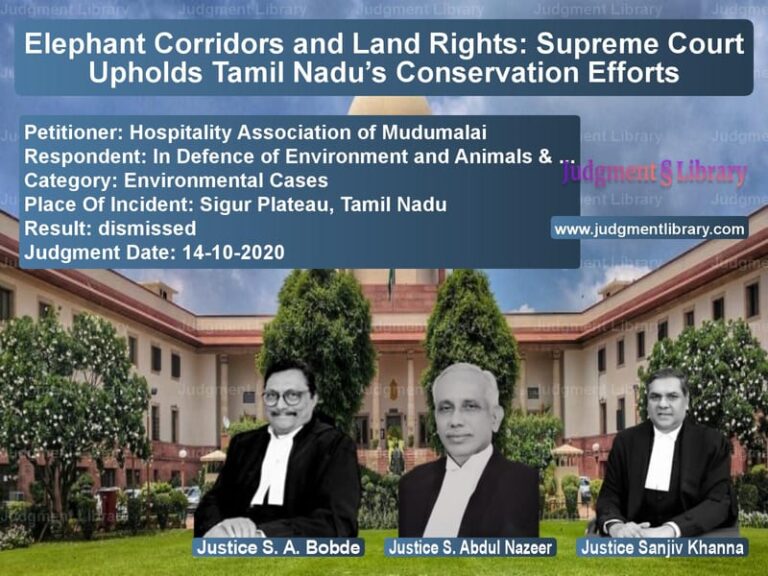Supreme Court Modifies Life Sentence in Domestic Dispute Murder Case
The Supreme Court of India recently delivered a judgment in the case of Nirmala Devi vs. State of Himachal Pradesh, where it modified the life imprisonment sentence of the appellant to a reduced sentence under Section 304 Part-I of the Indian Penal Code (IPC). The case involved the killing of the appellant’s husband, Mast Ram, in a domestic dispute. The court examined the circumstances surrounding the incident and determined that the case did not warrant a murder conviction under Section 302 IPC but instead fell under the purview of culpable homicide not amounting to murder.
Background of the Case
The case stemmed from a domestic quarrel in which the appellant, Nirmala Devi, allegedly assaulted her husband, Mast Ram, with a stick after an argument over financial matters. The incident took place on May 26, 2015, when the appellant’s daughter, Priyanka (PW-1), requested Rs. 500 from her father to attend an NCC camp. When Mast Ram refused to provide the money, a heated argument ensued between him and the appellant, ultimately leading to the fatal attack.
The prosecution’s case was built on the testimony of Priyanka (PW-1), who witnessed the incident. According to her statement, her mother struck her father multiple times on his head and legs, causing fatal injuries. Subsequently, the appellant, along with her son, Vinod, moved the body inside the house. The police were informed, and an investigation followed.
Legal Proceedings
- May 26, 2015: The appellant called the police, reporting that her husband had been missing since the previous night. Later, she claimed to have found him injured in the courtyard and moved him inside the house.
- May 27, 2015: The deceased’s nephew, Ghungriya Ram, filed a complaint, alleging foul play by the appellant and her son.
- An FIR was registered under Sections 302 and 201 IPC, and both accused were arrested.
- December 1, 2017: The Trial Court convicted Nirmala Devi under Section 302 IPC and sentenced her to life imprisonment, while her son Vinod was acquitted.
- May 23, 2022: The Himachal Pradesh High Court upheld the conviction and sentence.
- August 1, 2023: The Supreme Court modified the conviction to Section 304 Part-I IPC, reducing the sentence to time already served (nine years in custody).
Arguments by the Appellant
The defense presented the following arguments:
- The incident occurred in the heat of the moment, following a domestic altercation.
- The appellant had suffered physical abuse from her husband in the past, and the attack was not premeditated.
- The weapon used (a wooden stick) was not a deadly weapon, indicating that there was no intention to kill.
- The appellant was reacting to provocation, which should bring the offense under Exception 1 to Section 300 IPC.
Arguments by the Respondent (State of Himachal Pradesh)
The prosecution maintained that:
- The appellant intentionally caused the death of the deceased by repeatedly striking him.
- There was no evidence to suggest immediate provocation.
- The cause of death, as per the post-mortem report, was hemorrhagic shock and brain edema due to multiple injuries.
- The conduct of the appellant after the incident, including moving the body and initially misleading the police, suggested an intent to conceal the crime.
Key Observations by the Supreme Court
The Supreme Court carefully analyzed the facts and legal principles applicable to the case. The key findings were:
1. Nature of the Weapon and Circumstances
“The weapon used in the crime is a stick which was lying in the house, and which, by no means, can be called a deadly weapon.”
The Court noted that the lack of a deadly weapon and the spontaneous nature of the attack suggested that the offense was not premeditated.
2. Provocation and History of Abuse
“There used to be persistent quarrels between the deceased and the appellant. In one of such incidents, the leg of the appellant was fractured by the deceased, and a case was already pending against him for the said offense.”
The history of domestic abuse played a crucial role in the Court’s decision to reduce the charge to culpable homicide not amounting to murder.
3. Application of Exception 1 to Section 300 IPC
“In our considered view, the appellant is entitled to the benefit of doubt, inasmuch as the offense committed shall fall under Exception 1 of Section 300 IPC.”
Exception 1 to Section 300 IPC applies when a person commits homicide in a sudden fight or due to grave and sudden provocation.
Final Judgment
Based on these findings, the Supreme Court ruled:
“The conviction of the appellant is altered from Section 302 IPC to Part-I of Section 304 IPC. The appellant has already been incarcerated for a period of almost 9 years, and, therefore, we find that the sentence already undergone would serve the ends of justice.”
Read also: https://judgmentlibrary.com/supreme-court-grants-bail-in-bhima-koregaon-case-key-takeaways/
With this ruling, Nirmala Devi was released from custody, and her bail bonds were discharged.
Conclusion
The Supreme Court’s decision in Nirmala Devi vs. State of Himachal Pradesh underscores the importance of context in homicide cases, particularly those arising from domestic conflicts. The judgment reflects a nuanced approach to justice, ensuring that the legal system acknowledges the realities of domestic violence while upholding the rule of law. This case sets an important precedent for courts handling similar cases involving domestic disputes and provocation.
Petitioner Name: Nirmala Devi.Respondent Name: State of Himachal Pradesh.Judgment By: Justice B.R. Gavai, Justice J.B. Pardiwala.Place Of Incident: Himachal Pradesh.Judgment Date: 01-08-2023.
Don’t miss out on the full details! Download the complete judgment in PDF format below and gain valuable insights instantly!
Download Judgment: nirmala-devi-vs-state-of-himachal-pr-supreme-court-of-india-judgment-dated-01-08-2023.pdf
Directly Download Judgment: Directly download this Judgment
See all petitions in Murder Cases
See all petitions in Domestic Violence
See all petitions in Judgment by B R Gavai
See all petitions in Judgment by J.B. Pardiwala
See all petitions in partially allowed
See all petitions in Modified
See all petitions in supreme court of India judgments August 2023
See all petitions in 2023 judgments
See all posts in Criminal Cases Category
See all allowed petitions in Criminal Cases Category
See all Dismissed petitions in Criminal Cases Category
See all partially allowed petitions in Criminal Cases Category







